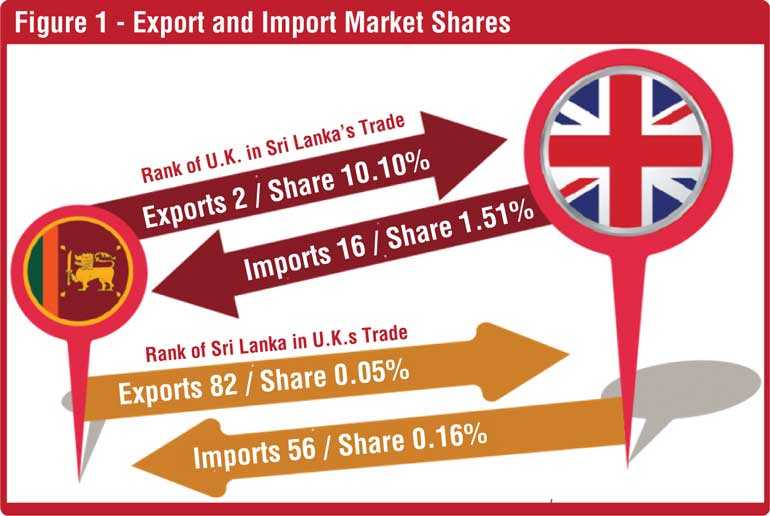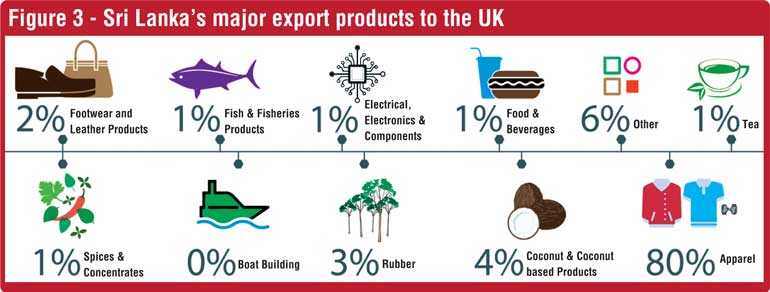Wednesday Feb 18, 2026
Wednesday Feb 18, 2026
Friday, 29 March 2019 00:00 - - {{hitsCtrl.values.hits}}



RIU Trade surveillance report in association with the Sri Lankan High Commission in London
London: The United Kingdom is one of the major trading partners of Sri Lanka, amounting to over 10% of the total annual trade. The trade between two countries has been on the upsurge for the last 18 years.
In this context, the GSP+ scheme under which Sri Lanka observes a great deal of preferential market access to the European Union including the UK, paves way to an immense potential to further enhance the trade performance between the two countries. However, the advent of Brexit gives rise to a new set of concerns to Sri Lanka. Thus preventive measures must be taken to secure and maintain the current preferential market access to the UK.
Sri Lanka exports nearly $ 3.0 billion worth of goods to the European Union and 29% of these exports are dominated by the UK, amounting to approximately $ 1.0 billion in 2018. Even though the other members of the EU are equally strong economically, their purchases from Sri Lanka are less than what is purchased by the UK. The figures depict the export market share and the major products exported to the UK.
Apparel is the most exported product to the UK in the diversified product basket. However, it is visible that there are more opportunities to penetrate the UK market through an array of further diversified products. When considering the sectors identified in the National Export Strategy, there is only 0% - 2% exports in the UK Hence, it is important to identify the market orientation and the capabilities of Sri Lanka to cater the UK market in these product sectors.
Importance of preferential market access for Sri Lanka in the UK: a case of EU GSP+
Sri Lanka currently has market access to the European Union, including the UK through the current European Union scheme of Generalised System of Preferences [Regulation (EU) No 978/2012 of the European Parliament and of the Council of 25 October 2012], which came in to effect on 1 January 2014 for a 10-year cycle and is due to end on 31 December 2023. This scheme aims to support economic growth and job creation in the beneficiary countries by generating increased export revenue. While benefiting from the market access gains offered under preferential import duty concessions under the standard GSP Scheme since 01.01.2014, Sri Lanka was readmitted to the EU Special Incentive Arrangement for Sustainable Development and Good Governance (GSP Plus) Scheme as of 19 May 2017.
Way forward with the UK market
Despite services exports not benefiting through GSP+ concessions, the trade potential for the services sector is promising. Efforts need to be explored to enhance trade between UK and Sri Lanka by promoting more services exports to this market. In this regard, Sri Lanka looks forward to promoting ICT/BPM and Wellness Tourism to further promote Sri Lanka’s exports in the UK to secure the share and get the support of the Sri Lankan diaspora in the United Kingdom in such promotions.
Post-Brexit situation
In a scenario of the UK leaving the EU with/without a trade deal, the main preoccupation of the GOSL will be, at least to secure the existing market access opportunities, which Sri Lanka is currently enjoying under the EU-GSP+ Scheme. However, in view of the UK’s long-standing favourable policies of trade and development with developing countries in the form of tariff and non-tariff concessions, it is highly unlikely that the UK will entirely terminate the EU-GSP+ Scheme when it leaves the EU after March 2019. Rather, the current EU-GSP Scheme will be continued over a period until the UK comes up with its own preferential tariff scheme outlining the criteria for selecting beneficiary countries, rules of origin and other measures.
Considering that Sri Lanka currently benefits from a positive and growing balance in its merchandise trade with the UK, it is important for Sri Lanka to be able to enjoy the existing GSP+ concessions for some time until it is graduated from the scheme, a few years after it first reaches the threshold of the World Bank ranking of Upper-Middle Income category. Sri Lanka does not have many years to be complacent of its current status. Therefore, a dialogue with the British government has already commenced at a very high level, which aims to ensure that Sri Lanka will continue to reap the benefits through an array of measures implemented by the UK Government in the form of tariff and non-tariff concessions. In a scenario of the UK leaving the EU with/without a trade deal with the EU, it is imperative that Sri Lanka’s trade position with the UK secured.
In this context, the Research Intelligence Unit (RIU), in association with the Sri Lankan High Commission in London, will be maintaining on-going surveillance on the Brexit situation as it evolves highlighting its critical impact and consequences for current and perspective UK – Sri Lankan exporters/importers.